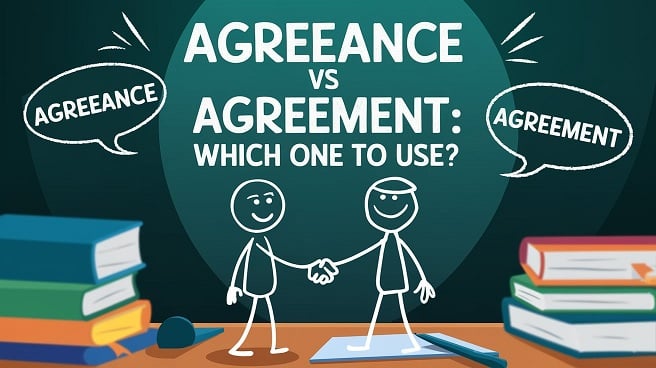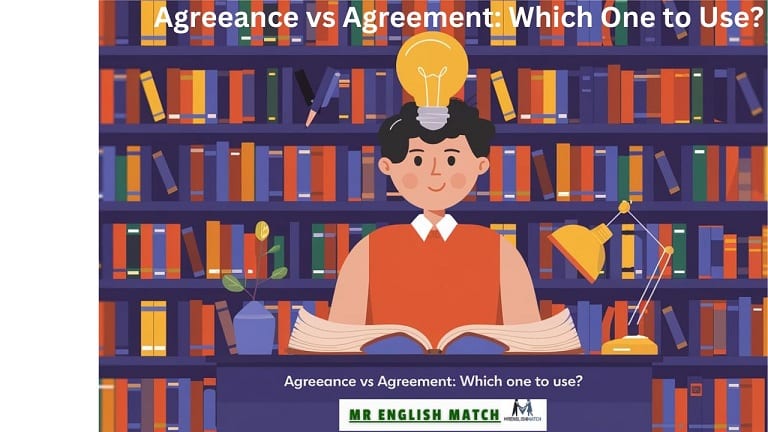When speaking or writing, especially in formal settings, choosing the correct word matters. One such pair of words often confused is Agreeance vs. Agreement: Which One to Use?. Both terms sound similar, but they differ significantly in meaning, usage, and tone. In this article, we’ll delve into the differences between “agreeance” and “agreement” and help you decide which one to use, exploring everything from their origins to practical guidelines for correct usage.
While “agreeance” and “agreement” both come from the root word “agree,” they’ve diverged in meaning and usage over time. “Agreement” is widely accepted in both formal and informal contexts, commonly used to describe mutual decisions or understandings. In contrast, “agreeance” has fallen out of favor, now considered less standard and often reserved for casual or specific writing styles. Knowing when to choose one over the other ensures clear, professional communication in any context. Let’s dive into their nuances to see when each term is appropriate.
What Is the Difference Between Agreeance and Agreement?
“Agreeance” and “agreement” may seem interchangeable, but they actually serve distinct purposes. To understand the difference between agreeance vs. agreement, let’s start with clear definitions and look at when to use each.
Agreeance

- Definition: Agreeance is an older, less common term that essentially means a state of being in agreement.
- Tone: It’s informal and often considered old-fashioned or pretentious in modern contexts.
- Usage: Rarely used in formal writing; more suited to casual or specific styles.
Example: “There was a sense of agreeance among the team members.”
Agreement

- Definition: Agreement refers to a mutual understanding or a decision reached between two or more parties.
- Tone: Widely accepted in both formal and informal contexts.
- Usage: Preferred in professional, legal, and everyday writing.
Example: “The two companies reached an agreement on the project.”
In summary: Use “agreement” for most situations, especially formal contexts. “Agreeance” might work in specific, informal settings, but it could sound awkward or outdated.
Agreeance vs. Agreement: Key Differences
To clearly see the nuances between these two words, let’s break down their primary differences in a comparison table:
| Feature | Agreeance | Agreement |
|---|---|---|
| Definition | State of being in agreement | Mutual understanding or decision |
| Formality | Informal and uncommon | Formal and widely accepted |
| Clarity | Less clear, can sound ambiguous | Direct and widely understood |
| Common Usage | Rarely used in modern writing | Used in most settings, formal and informal |
| Best Usage | Casual speech, specific writing styles (rare) | Formal writing, professional settings |
| Analogy | Feeling of satisfaction after a handshake | The handshake itself, finalizing a decision |
Note: In legal documents, contracts, or business writing, “agreement” is always preferred because it conveys clarity and professionalism.
Origins and Etymology
Understanding the origins of “agreeance” and “agreement Which One to Use?” can clarify why one is preferred today.
The History of “Agreeance”
- Early Origins: “Agreeance” first appeared in the early 15th century, originating in Scottish English. It was used to describe the state of agreement.
- Evolution: Over time, “agreeance” became rare, especially as English evolved, favoring “agreement” as the more practical, universally accepted term.
The History of “Agreement”
- Longer History: “Agreement” has a more extensive history, dating back to the late Middle English period (around 1375–1425).
- Etymology: The word “agreement” comes from the Old French word “agrement,” which combines “agree” with the suffix “-ment,” indicating the action or result of agreeing.
- Current Use: Due to its historical prevalence and clarity, “agreement” remains the standard term.
Interesting Fact: “Agreement” covers both the action of coming to terms and the resulting state, while “agreeance” focuses on the state of agreement alone.
Why the Confusion?
It’s natural to feel uncertain about agreeance vs. agreement, given their similarities. Here’s why confusion arises and how you can avoid it.
Similar Root Words
Both “agreeance” and “agreement” stem from the root word “agree,” which is why they’re easily confused. However, only “agreement” has stood the test of time as the standard term for formal agreements and mutual decisions.
Differences in Modern Usage of agreeance vs agreement
“Agreement” has become dominant in modern English because of its clarity and broad applicability. Meanwhile, “agreeance” remains less common and may even sound outdated or unusual to native speakers.
Tip: When in doubt, choose “agreement” unless you’re aiming for a specific, informal tone.
Practical Guidelines for Choosing Between Agreeance and Agreement
When writing or speaking, follow these guidelines to ensure clarity:
- Use “agreement”:
- For any formal writing or communication.
- In legal contexts, contracts, and business settings.
- Whenever you want to avoid ambiguity.
- Consider “agreeance” only:
- In very informal settings.
- If you want a specific, less common word choice.
- In creative writing or stylistic settings, but with caution.
Pro Tip: In most situations, agreement is the safer, more accepted choice
Examples of Correct Usage
Let’s look at how each word functions in different types of sentences.

Using “Agreeance” in Sentences (Informal)
Here are example sentences using “agreeance” in informal contexts:

- “There was a strong agreeance among the team to push the project deadline back.”
- “After discussing the dinner menu, everyone came to an agreeance on pizza.”
- “The friends reached an agreeance about where to go for their vacation.”
- “During the meeting, there was an overall agreeance that the new policy was beneficial.”
- “Despite their differences, they found an agreeance on the need for more flexible work hours.”
- “We had a quick agreeance to meet up at the café for coffee this weekend.”
- “The siblings shared an agreeance on how to split the chores for the week.”
- “There was a light-hearted agreeance that the cat should be named ‘Whiskers.'”
- “As they discussed their favorite books, they reached an agreeance on the top three titles.”
- “After some debate, the group came to an agreeance on which game to play first.”
- There was a general agreeance that the office party should be held on Friday.”
- “They reached an agreeance about which movie to watch.”
Using “Agreement” in Sentences (Formal and Informal)
Here are ten example sentences using “agreement” in both formal and informal contexts:

- “The board members signed the agreement to finalize the merger.” (Formal)
- “We reached an agreement to split the expenses for the trip.” (Informal)
- “The parties involved in the dispute have come to a written agreement.” (Formal)
- “Our agreement was to help each other with our projects this semester.” (Informal)
- “The agreement stipulates that payments will be made monthly.” (Formal)
- “They made a casual agreement to meet every Friday for lunch.” (Informal)
- “The legal team reviewed the agreement before submission.” (Formal)
- “He expressed his agreement with the proposal during the discussion.” (Informal)
- “The agreement includes clauses on confidentiality and non-compete.” (Formal)
- “We had a verbal agreement that we would collaborate on the new initiative.” (Informal)
- “Both parties came to an agreement on the contract terms.” (Formal)
- “We had an agreement to meet at 10 AM.” (Informal)
- “The contract outlines the agreement between the two companies.” (Formal)
Case Study: Agreeance vs. Agreement in Professional Communication
Consider this scenario: a business meeting with executives discussing a merger. One executive mentions, “I believe there’s a strong agreeance on the new partnership.” Another executive might respond, “Yes, but let’s formalize it as an agreement.” Here, the word choice matters. “Agreement” provides the clarity and formality needed for a business deal, whereas “agreeance” would feel too casual and potentially confusing.

In cases where clear communication is critical, always use “agreement.”
When to Use Agreement: A Quick Reference Table
Here’s a table for quick reference on when to choose “agreement” over “agreeance”:
| Context | Word Choice | Reason |
|---|---|---|
| Formal Writing | Agreement | Clarity and professionalism |
| Legal Documents | Agreement | Universally accepted and direct |
| Business Communication | Agreement | Precise and suitable for professional settings |
| Informal Speech | Agreeance (sparingly) | Adds casual tone, but may sound unusual |
| Creative Writing | Either (context-dependent) | Depends on stylistic choice |
In most cases, agreement is the better word to use.
Common Mistakes and How to Avoid Them
To avoid errors, keep these points in mind:
- Avoid using “agreeance” in professional or formal contexts where clarity is essential.
- Double-check if you’re unsure. In almost all cases, “agreement” will be the preferred choice.
- Think of the context: Does the sentence require a widely accepted term? Use “agreement.”
Quick Tip: Remember, “agreement” is like the handshake sealing the deal, whereas “agreeance” is the feeling of satisfaction after.
Frequently Asked Questions
Why does “agreeance” sound odd?
“Agreeance” sounds unusual because it’s an outdated term with limited use in modern English.
Is “agreeance” wrong to use?
Not exactly, but “agreement” is more widely accepted and understood.
Why do some people still use “agreeance”?
It may appear in casual speech or creative writing but is rarely seen in formal contexts.
Conclusion
In conclusion, both “agreeance” and “agreement” represent the idea of mutual understanding. However, for clarity, professionalism, and common usage, “agreement” is the preferred term in nearly all contexts. The next time you need to express shared understanding or mutual decision, reach for “agreement”—it’s the handshake that seals the deal, not just the feeling that follows.
Use this guide to choose your words wisely and communicate with precision, whether in business settings, writing, or everyday conversation.
You Might Like also:
- Totalling vs. Totaling: Which Spelling to Use?
- Long Term or Long-Term: the Right Choice in Writing?
- Pre vs Post: Which Prefix to Use?
Sources
Cambridge Dictionary (Agreement

John Robert is a seasoned grammar enthusiast and the insightful voice behind MrEnglishMatch. With years of experience in language arts and a passion for clear, effective communication, John’s blog posts blend expertise with approachable advice. His deep understanding of grammar and style helps readers sharpen their writing skills and master the nuances of English. When not blogging, John enjoys exploring new languages and reading classic literature.







